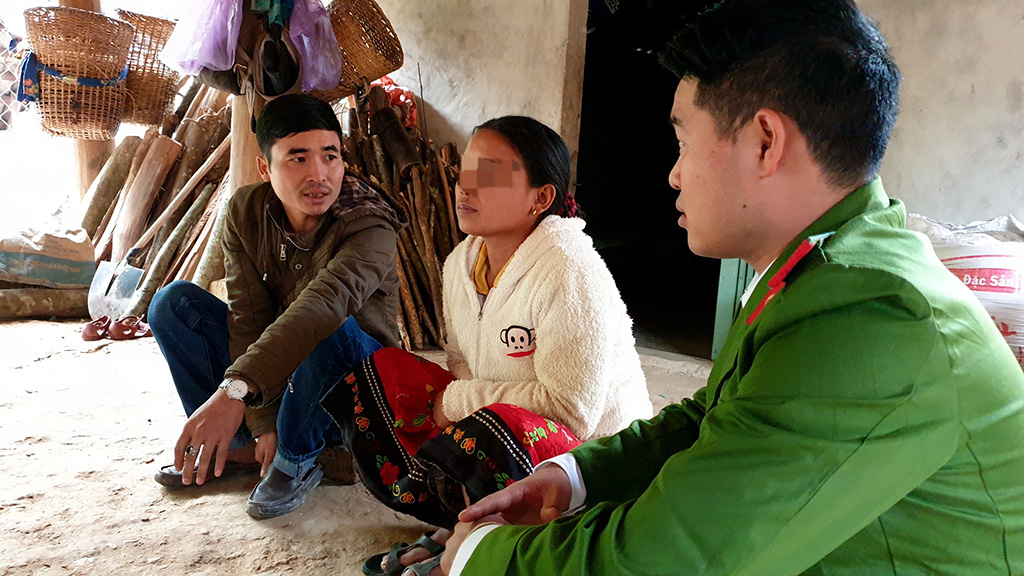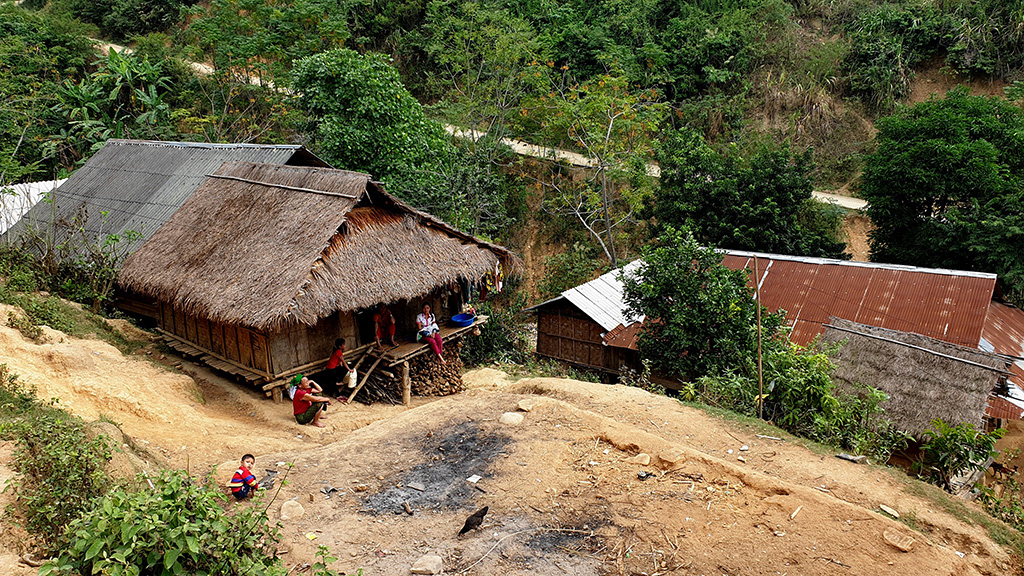In September 2019, two women of the Kho Mu ethnicity from Huu Kiem Commune in the north-central province of Nghe An arrived in northern Quang Ninh Province en route to China to sell newborn babies when authorities detected and ceased the clandestine operation.
>> Newborns for sale (Part 2): When victim becomes dealer
Despite the enormous efforts of the Nghe An authorities to eradicate the sale of newborn babies, the racket continued to linger in the background.
Intercountry adoption rings lay lower, waiting for another opportunity to thrive again.
The climactic escape
As mentioned in earlier installments of Tuoi Tre (Youth) newspaper's three-part series, the two Kho Mu women who embarked on the newborn trade journey are Lu Thi Van and Moong Thi Phuong. Both hail from Dinh Son 2 Village of Ky Son District.
After the intervention at the Quang Ninh border area, Phuong returned home and delivered her baby there.
Van also chose to return, but left the residence with her husband shortly after. Insider sources informed local police that the couple moved to work for a factory in northern Vietnam.
Because of the commonplace nature of the illicit child trade, pregnant women in Huu Kiem Commune are subject to more diligent scrutiny from local police.
Nguyen Van Truong, a police officer from Huu Kiem Commune, looked back at the climactic escape involving the two pregnant women.
Seven days prior to the incident, Truong was checking up on the pregnant women of Dinh Son 2 Village and was greeted by Van and Phuong, both of whom turned out to be absent when he revisited their home two days later.
According to their relatives, the two women went to work in their cropland. As the crops of the Kho Mu people are located far from home, their trip may take a few days.
Police officers waited for several days to check back on Van and Phuong, but they still had not returned. The officers then scrambled to look for the whereabouts of the two women, fearing the worst.
In September 2019, Truong received a phone call from Quang Ninh Police; they had detected two pregnant Kho Mu women and were keeping them safe.
They were quickly identified as Van and Phuong.
“No one would have thought [the two women] would organize such an ‘escape’ scheme to sell their newborns,” Truong said.
The success of the mission was greatly attributed to Quang Ninh police officer as the unit is always highly vigilant about pregnant women approaching their border town.
Upon their arrival to Quang Ninh, Van and Phuong were immediately singled out for inspection by local police, and they had to admit their intention to cross the border to sell their babies.
“We try our best to keep tabs [on pregnant women], yet all it takes is a phone call to set up an appointment with Chinese rings. Another phone call to board a bus heading to Quang Ninh via National Highway 7 and the women will be taken to China within the same day,” Truong shook his head as he talked.
Police-and-population health officer
Huu Lap Commune of Ky Son District is rather desolate.
Cruising through the territory, Xong Ba Vu, a communal police officer, headed toward Cha Lan Village on his beaten-down motorbike.
Upon arrival, he pulled out a spreadsheet full of bullet points, names and numbers, and started to take a glance through one entry at the very top.
He then walked to a humble house down the bank of a stream, where Hoc Thi Xanh, a 17-year-old Kho Mu girl, lives with her husband.
Xanh was expecting a baby, which was the topic of Vu’s inquiries. After putting checkmarks on the spreadsheet and giving Xanh a few recommendations, Vu set out to visit another expectant mother on the list.
As a local to Cha Lan, Vu knows his way around the village to do his usual law enforcement tasks. However, since the newborn trade phenomenon hit the locale, Vu also took up the position of a population health officer.
“This memo lists all expectant mothers in the village. My job is to visit each one of these every few days to verify the unborn child’s health status as well as the presence of the mothers in the village,” Vu said.
|
|
| A corner of Cha Lan Village, the hotbed of Nghe An Province’s newborn trafficking issue, as captured in this photo in 2020. Photo: Quoc Nam / Tuoi Tre |
Nguyen Van Truong, another population health officer, also ferried a copy of this spreadsheet with him.
Since the discovery of 20 expectant mothers preparing to sell their newborn children in the villages of Dinh Son 1, Dinh Son 2 and Huoi Tho, Truong is responsible for staying up-to-date on all of the pregnant women in his area.
“[We] need to monitor their statuses up until the child is born, only then can we leave them off of the sheet,” Truong said.
According to Lt. Col. Lo Van Thao, deputy chief of the Ky Son police bureau, police personnel have been mobilized to monitor unborn children in every single village.
“At the slightest signal [of illicit activity], [the officers] would take prompt action to prevent mothers from leaving for China for child peddling,” Thao declared.
Thanks to the synchronized efforts of local authorities, the prevalence of newborn trafficking has noticeably diminished in the first part of 2020.
Still, the community is on high alert.
Despite a lack of concrete evidence, Huu Kiem police officers have noticed a changing landscape in newborn trafficking as perpetrators take advantage of loopholes in the law.
Some Kho Mu couples have been reportedly engaged in newborn trade journeys to China under the guise of 'labor export.'
Some other Kho Mu women are allegedly being sent to China on 'marriage contracts.' After the child is born, they are released as per a 'liquidation agreement' and receive an amount of money as compensation.
“These activities all happen in China. Despite the intelligence, officials in our communes and districts can’t really do anything,” Truong said.
Newborn trading must be recognized as human trafficking: police
Maj. Gen. Nguyen Huu Cau, director of the Nghe An Department of Police, said that newborn trafficking is the latest ploy of human trafficking rings and it is most prevalent in the Kho Mu community of Ky Son district.
Nghe An police officers have initiated discussions with the provincial People’s Procuracy and the Criminal Investigation Department under the Ministry of Public Security, even sending an official request to multiple ministerial bodies, but they have not yet received a specific resolution.
According to Cau, the 2017 amendment to Vietnam’s penal code detailed five crimes related to human trafficking, none mentioning trade of unborn children.
Meanwhile, in order to constitute a crime, an action must have a victim. This is the catch that makes the discussion on criminalizing newborn trade more complicated than it seems.
“Some law experts argue that an unborn child is not yet a human being as they might have chronic defects or may die at birth,” said Cau.
There are two resolutions to the problem, according to Cau.
The first one requires a re-negotiation of the Vietnam-China Treaty on Mutual Legal Assistance in Criminal Matters.
“The treaty was signed in 1998 and requires a modification to grant our police permission to enter China and vice versa,” Cau said.
The other requires the Ministry of Public Security, the Ministry of Justice, and the Supreme People’s Procuracy to issue a joint circular addressing newborn trade.
In the long term, the problem also needs to be addressed in the penal code, he said.
Like us on Facebook or follow us on Twitter to get the latest news about Vietnam!



















































